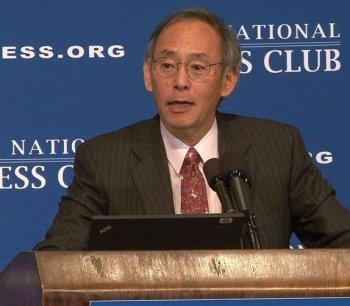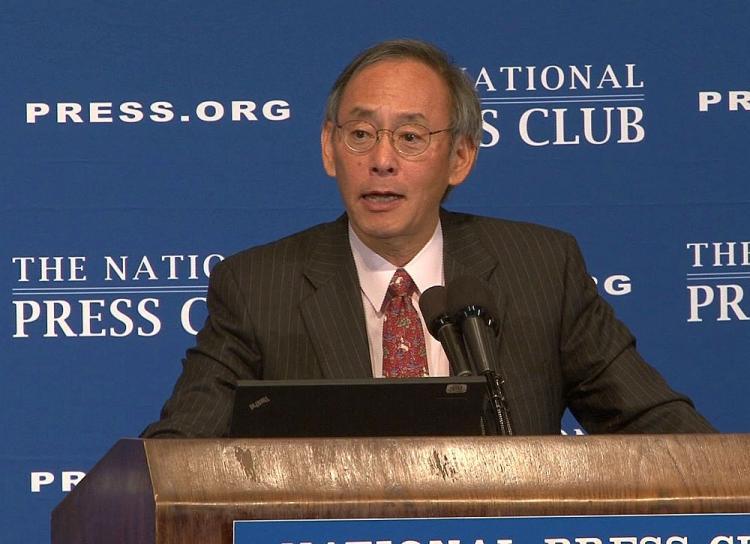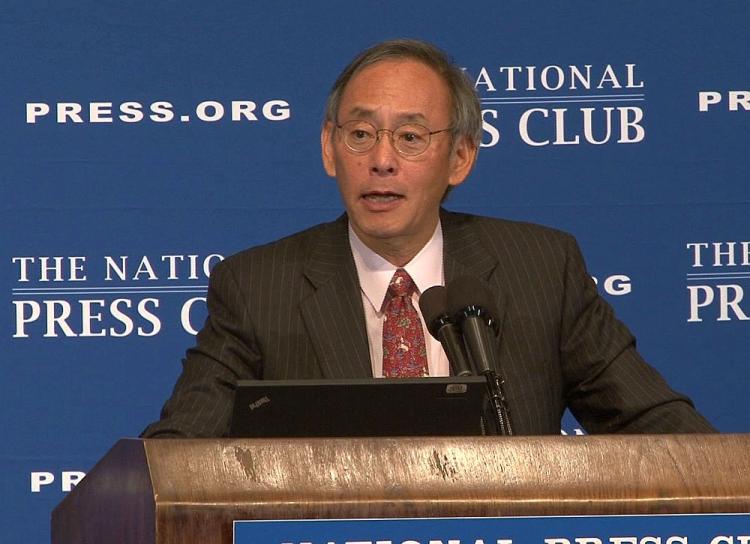The man tasked with implementing Obama’s ambitious green energy revolution, Energy Secretary Steven Chu, made the case on Monday for continued government spending on research and development (R&D) for green technology innovation.
The secretary noted that the Recovery Act Fund, which channeled additional money into energy R&D was “an important down payment and a very important part of what we have to do.”
“Post stimulus, are we going to return to the downward trend, or are we going to do something about it?” he asked an audience of hundreds on Monday.
Speaking at the National Press Club, the secretary laid bare how the indicators are showing a decline in U.S. innovation, while our competitors, namely China, are surpassing us.
Secretary Chu also emphasized that innovation in science and technology has been proven to increase productivity.
Our economic competitiveness depends on jump-starting the next round of American innovation in clean energy, he said.
Secretary Chu harkened back to the example of President Eisenhower’s 1957 response to the Soviet Union’s launch of a Sputnik satellite ahead of the United States.
Eisenhower understood the moment as a call for action and invested in large increases in R&D and in scholarships for advanced science and engineering education. The secretary obtained his doctorate with that support, he said. He later earned a Nobel Prize for physics (1997) and registered 10 patents.
From Eisenhower’s investments, the United States emerged as a global leader in science and technology. History has proven that investments in science work, suggested Secretary Chu.
He said that today we are falling behind again, with disturbing trends showing increases in China’s lead over the United States in the manufacture of high-tech goods.
“For centuries, America has led the world in innovation. Today, that leadership is at risk. America still has the opportunity to lead in a world that will essentially lead a new industrial revolution. But I think that time is running out,” he said.
Citing a report produced by business leaders, including Bill Gates, former CEO of Microsoft, Ursula Burns, CEO of Xerox, and Norm Augustine, former CEO of Lockheed Martin, Secretary Chu supported the idea of government funding for the energy sector.
“The energy business requires investments of capital at a scale that is beyond the risk threshold of most private sector investors. This high level of risk ... exacerbates the historic dearth of investments in new ideas, creating a vicious cycle of status quo behavior,” states “A Business Plan for America’s Energy Future.”
Chu recommends that sensible, long-range energy policies that have bipartisan support to guide the private sector are needed. He also said increased support of energy R&D, especially where private investments don’t recoup the full value of the shared social good, or when a new technology would displace an embedded way of doing business would be helpful.
The last thing a government should do during a time of austerity is to underfund R&D, Chu said.
The secretary noted that the Recovery Act Fund, which channeled additional money into energy R&D was “an important down payment and a very important part of what we have to do.”
“Post stimulus, are we going to return to the downward trend, or are we going to do something about it?” he asked an audience of hundreds on Monday.
Speaking at the National Press Club, the secretary laid bare how the indicators are showing a decline in U.S. innovation, while our competitors, namely China, are surpassing us.
Secretary Chu also emphasized that innovation in science and technology has been proven to increase productivity.
Our economic competitiveness depends on jump-starting the next round of American innovation in clean energy, he said.
Secretary Chu harkened back to the example of President Eisenhower’s 1957 response to the Soviet Union’s launch of a Sputnik satellite ahead of the United States.
Eisenhower understood the moment as a call for action and invested in large increases in R&D and in scholarships for advanced science and engineering education. The secretary obtained his doctorate with that support, he said. He later earned a Nobel Prize for physics (1997) and registered 10 patents.
From Eisenhower’s investments, the United States emerged as a global leader in science and technology. History has proven that investments in science work, suggested Secretary Chu.
He said that today we are falling behind again, with disturbing trends showing increases in China’s lead over the United States in the manufacture of high-tech goods.
“For centuries, America has led the world in innovation. Today, that leadership is at risk. America still has the opportunity to lead in a world that will essentially lead a new industrial revolution. But I think that time is running out,” he said.
Citing a report produced by business leaders, including Bill Gates, former CEO of Microsoft, Ursula Burns, CEO of Xerox, and Norm Augustine, former CEO of Lockheed Martin, Secretary Chu supported the idea of government funding for the energy sector.
“The energy business requires investments of capital at a scale that is beyond the risk threshold of most private sector investors. This high level of risk ... exacerbates the historic dearth of investments in new ideas, creating a vicious cycle of status quo behavior,” states “A Business Plan for America’s Energy Future.”
Chu recommends that sensible, long-range energy policies that have bipartisan support to guide the private sector are needed. He also said increased support of energy R&D, especially where private investments don’t recoup the full value of the shared social good, or when a new technology would displace an embedded way of doing business would be helpful.
The last thing a government should do during a time of austerity is to underfund R&D, Chu said.







